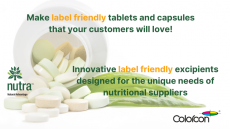International alliance raising awareness of Omega 3 and folic acid

The resources are available to view now on the alliance's new Mind The Gap platform - an addition to the IADSA website launched earlier this year in an aim to improve communication about the benefits of dietary supplements.
The first resource, ‘Omega 3: The Making of You’, addresses a baby’s first 1,000 days of life, from conception to the age of two. It explores how DHA Omega 3 is vital at this stage for the development of the brain and eyes during pregnancy.
Created with support from GOED (the Global Organization for EPA and DHA Omega 3s), the new resource also looks at the link between Omega 3 and the reduced risk of pre-term birth, which results in the death of one million babies every year.
Scientific evidence is outlined showing that DHA supplementation during pregnancy can help to increase the length of gestation in women, especially those with low levels of Omega 3 in their diet.
Also new to the site is the ‘Folic Acid: The Best of Both Worlds’ resource, which explores the benefits of a combined folic acid strategy encompassing fortification and supplements.
The resource explains that scientists agree that consumption of sufficient folate before conception and during early pregnancy significantly lowers the risk of giving birth to a baby with an abnormality to the brain or spine – known as a neural tube defect (NTD).
However, a large proportion of pregnancies are unplanned, so many countries have put in place programmes to fortify foods with folic acid. As a result, rates of NTDs have fallen but more needs to be done as globally there are still 18.6 NTD births per 10,000 live births (Blencowe et al, 2015).
The communication material highlights that in the USA, rates of NTDs are among the lowest in the world at just 5 per 10,000 live births. It explains that this can be attributed to America’s combined approach of both fortifying foods with folic acid and recommending that women of child-bearing age consume a folic acid supplement daily.
Cynthia Rousselot, director of technical and regulatory affairs at IADSA, said: “Mind the Gap is changing the way we communicate positive stories about supplements.
"It provides a powerful visual tool, in both digital and physical formats, to explain the importance of supplementation in key areas of health and wellbeing. Our new Omega 3 and folic acid stories complement the existing vitamin D resources and we are already planning further topics for the Mind the Gap series.”













